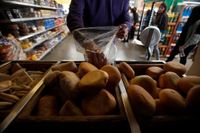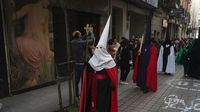On Friday, April 18, 2025, followers of the Catholic Church in Chile will commemorate Holy Week, a time of reflection and religious observance. However, this year, the holiday has become a contentious issue, with retail giants Falabella, París, and Ripley announcing their decision to open stores as usual on Good Friday.
This move has sparked significant backlash from employees who argue that their right to a day off on this traditional holiday is being undermined. For many years, Good Friday has been a day of rest for workers, and the announcement from these major retailers has reignited a debate over labor rights and holiday observance in Chile.
The Chilean Congress had previously attempted to advance a bill that would declare Good Friday an irrevocable holiday, but the initiative did not progress in time for this year's observance. According to Chilean labor legislation, certain holidays are designated as irrevocable, including New Year's Day, Labor Day, and Christmas, which guarantees workers a day off. However, Good Friday is classified as a normal holiday, allowing non-essential businesses to operate.
This year marks a departure from tradition, as retail stores have historically closed on Good Friday. The decision by Falabella, París, and Ripley to open their doors comes with a compensation system for workers who are required to work that day. The Labor Directorate (DT) has issued a ruling clarifying the rights of employees in this context, stating that workers who have not previously worked on Good Friday have an acquired right to a complete day of rest. However, new employees do not share this right.
As a result, all stores are permitted to operate on Good Friday, albeit with the risk of facing penalties if they violate the acquired rights of long-term employees. For instance, supermarkets like Jumbo and Santa Isabel will open at 9:00 AM and close at 9:00 PM throughout the weekend.
In response to the situation, Deputy Diego Schalper from the traditional right-wing party Chile Vamos introduced a bill to the National Congress that sought to classify Good Friday as an irrevocable holiday. Schalper emphasized the importance of allowing workers to observe the day as a time for religious reflection. He stated, "The economic development of any country is compatible with values that are essential for its proper functioning. An economy only works well to the extent that families are strengthened and other freedoms are also well protected." However, this bill was not scheduled for discussion during the week of April 14-20, making it impossible for it to be debated or enacted in time.
The National Chamber of Commerce (CNC), which represents retailers in Chile, criticized the push for Good Friday to be recognized as an irrevocable holiday, suggesting that the timing of the proposal is politically motivated due to upcoming parliamentary elections in October. CNC President José Pakomio remarked, "The presentation of this bill, just weeks before the Holy Week festivities, lends itself to the assumption of electoral populism and opportunism."
The government, led by President Gabriel Boric, has been closely monitoring the debate. Minister of Labor Giorgio Boccardo reiterated that the government will comply with the ruling of the Labor Directorate, which aims to protect the rights of workers who have historically not worked on Good Friday. Boccardo stated, "We have been very clear. The Labor Directorate has already spoken and seeks to protect those workers who historically have not worked on Good Friday, which is different from thinking about involving more sectors in a potential irrevocable holiday."
Religious leaders have also weighed in on the matter. Archbishop of Santiago, Fernando Chomalí, urged retail businesses to respect their employees' rights to observe Good Friday. He commented, "This intangible heritage not only deserves respect but must be safeguarded, as the economic benefit of one day will come at the cost of a significant loss of social cohesion and shared values that are sources of unity and fraternity."
As Chile prepares for the observance of Holy Week, the debate surrounding Good Friday highlights broader issues of labor rights and the intersection of commerce and tradition. While some communities may celebrate with solemnity and reflection, the actions of major retailers have cast a shadow over this significant religious observance.
In addition to the situation in Chile, the article also sheds light on how Easter holidays are celebrated across Europe. The division between Northern and Southern European countries is evident, with Northern nations, particularly those with Protestant roots, granting more days off during Holy Week compared to their Southern Catholic counterparts.
For instance, Germany observes Good Friday, Easter Monday, Ascension Day, and Whit Monday as public holidays. Conversely, many EU countries do not recognize Easter Sunday as an official holiday, even though Easter Monday is widely celebrated. In Spain, only certain autonomous communities, such as Catalonia and the Basque Country, recognize Easter Monday as a holiday.
Similarly, the article highlights the unique traditions of various Spanish regions during Holy Week. For example, in Seville, the Carretería brotherhood's procession begins at 4:25 PM, while in Málaga, the Monte Calvario brotherhood starts at 4:00 PM. Each region has its own distinct customs and processions that reflect the cultural and religious significance of the holiday.
As the first long weekend of the year approaches, with Holy Week falling on April 18 and 19, many Chileans are looking forward to a break. However, the ongoing debate about the observance of Good Friday serves as a reminder of the complex interplay between labor rights, commerce, and cultural traditions.







